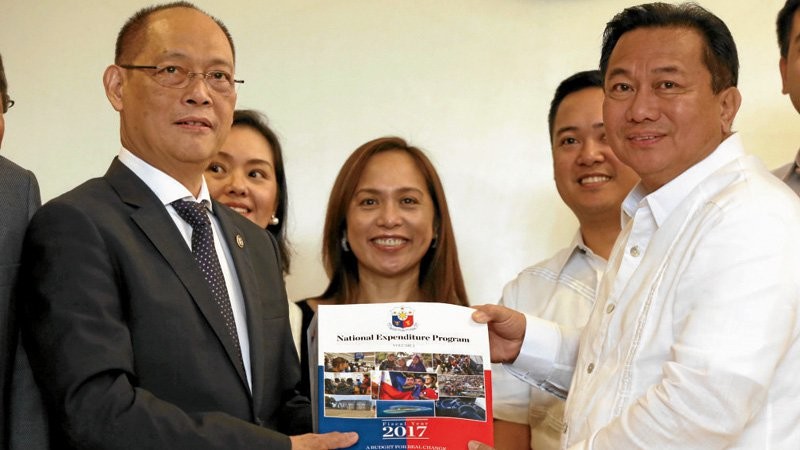Flesh and bone

‘BUDGET FOR REAL CHANGE’ Budget Secretary Benjamin Diokno hands over a copy of the proposed 2017 General Appropriations Act to Speaker Pantaleon Alvarez and other lawmakers. The “Budget for Real Change” allocates resources to programs and projects on the Duterte administration’s 10- point socioeconomic development agenda. CONTRIBUTED PHOTO
The Duterte administration submitted its first proposed national budget on Monday. The record P3.35-trillion draft law, President Duterte said in his traditional budget message, “gives flesh and bone to the promise by which I won as President: to fight for social justice.”
Is it in fact a social justice budget?
It builds on the fiscal and financial reforms started or continued by the previous administration—reforms, incidentally, which had drawn scathing criticism from economist Benjamin Diokno, now back as budget secretary. It is no small thing that the President’s budget message acknowledges the work that went before, as well as the work that remains to be done.
“The government’s finances are in a much better shape: in fact, it is now among the world’s most credible debtors after earning investment grade credit ratings. However, because of underspending, we have deprived our citizens with much-needed services. Their taxes have likewise bloated through time due to outdated tax rates.”
Fair enough, for executive-summary purposes.
The proposed National Expenditure Program or NEP invests much more in education than even the previous education-obsessed administration. From P433 billion in the current or 2016 budget (already up 40 percent from the previous year), the proposed budget for the Department of Education is now P567 billion—up 30 percent. The proposed budget for state universities and colleges is P58 billion, up 18 percent from the current P49 billion. Add the P13 billion for the Commission on Higher Education and almost P7 billion for the Technical Education and Skills Development Authority, and the total proposed outlay for education is just about P700 billion. This is a major investment in the country’s future, not only providing more funds for salaries or more than double the 2015 allocation for maintenance and operating expenses, but also over P140 billion for capital outlay.
The proposed budget for the judiciary includes a healthy increase from P26.7 billion in the current year to P32.5 billion next year: up almost 22 percent. About 10 percent of this allocation is reserved for the building of more Halls of Justice. This, the President said, will “declog the courts and hasten the resolution of cases,” in order to “reverse our people’s belief that justice in our country is illusory.” This assertion can stand some nuancing, but the general thrust is welcome. All this is complemented by a P16-billion budget (up 16 percent) for the Department of Justice.
There is a renewed emphasis on infrastructure development; total allocation amounts to P860.7 billion, an increase of almost 14 percent. “This allocation,” the President said, “will, among others, be used to fix our transport infrastructure. Road networks, railways, seaport systems, and airport systems will have a combined P355.7 billion next year.”
As expected, the security services will receive a major boost, too: the Armed Forces of the Philippines up 15 percent to P130.6 billion, the Philippine National Police up 24.6 percent to P110.4 billion. President Duterte explains the peace and order thrust as part of his development framework:
“Real development cannot be achieved if our people do not feel safe and secure.” Whether the increases are in fact part of the fight for social justice is open to argument.
But the proposed 2017 budget is shadowed by the possible return of the pork barrel. The halls of both chambers of Congress are rife with reports that lawmakers can once again request funding for their favorite projects. “Those are rumors but they are not true. There is no PDAF in this budget. Let’s put it that way,” Diokno told reporters, referring to the Priority Development Assistance Fund that was outlawed by the Supreme Court in 2013. Members of the minority in the House of Representatives also denied that there was pork.
“This is not a violation of the Supreme Court decision on the PDAF, because all of these would be incorporated in the GAA or General Appropriations Act,” Rep. Edcel Lagman said. “And there is no post-budget approval to be done by members of the Congress, which was the one invalidated by the Supreme Court in the PDAF case: post-approval intervention.”
Okay. If you say so. But together with the presence of lump sum allocations in the proposed budget, this new opportunity for “congressmen to request for what’s good for their constituents” (to quote Diokno) means happy days in Congress are here again. Apparently, the fight for social justice requires the oiling of the wheels.















